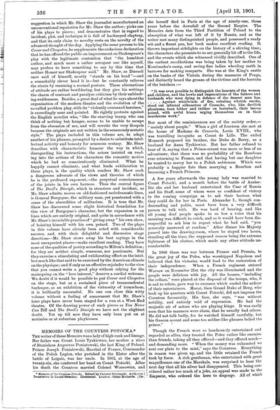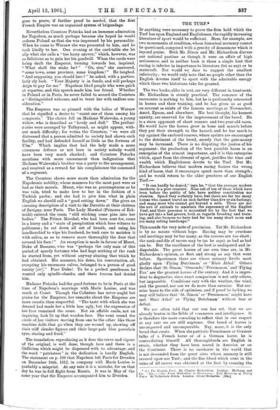MEMOIRS OF THE COUNTESS POTOCKA.* THE writer of these Memoirs
was a lady of high rank and lineage. Her father was Count Louis Tysldewicz, her mother a niece of Stanislaus Augustus Poniatowski, the last King of Poland. Prince Joseph Poniatowski, Marshal of France, Commander of the Polish Legion, who perished in the Elster after the battle of Leipsic, was her uncle. In 1802, at the age of twenty-six, she conferred her hand on Count Potocki. After his death the Countess married Colonel Wonsowicz, and
• Memoirs of the C,ounloas Potocka. Edited by Casimir Stryienski. Authorise Translation by Lionel Strachey. Illustrated. London Grant Richard& LIU.;
she herself died in Paris at the age of ninety-one, three years before the downfall of the Second Empire. The Memoirs date from the Third Partition of Poland to the absorption of what was left of it by Russia, and as the writer met many distinguished people, and possessed a ready wit and a fluent pen, her book makes excellent reading. It throws important sidelights on the history of a stirring time; the characters she presents to us are generally hit off to the life, and the events which she witnessed vividly described. One of the earliest recollections was being taken by her mother to Kosciuszko's camp, and seeing fine ladies wheeling earth in barrows for making ramparts. She was at the King's castle on the banks of the Vistula during the massacre of Praga, and distinctly heard the groans of the victims and the hurrahs of the butchers :—
" It was even possible to distinguish the laments of the women and children, and the howls and imprecations of the fathers and husbands who were dying in defence of the dearest man has.
Against whirlwinds of fire, exhaling whitish smoke, stood out infernal silhouettes of Cossacks, who, like devilish phantoms, turn hither and thither on horseback, their lances poised, with awful hisses urging themselves on in their murderous work."
But most of the reminiscences are of the society order,— " mainly about people." When a girl of fourteen she met at the house of Madame de Cracovie, Louis XVIII., who was travelling incognito as Count de Lille. The exiled Monarch proposed his brother, the Duke de Berry, as a husband for Anna Tyskiewicz. But her father refused to hear of it, saying that a Prince-errant was more or less of an adventurer, that there was no probability of the Bourbons
ever returning to France, and that having but one daughter he wanted to marry her to a Polish nobleman. Which was probably a happier fate than marrying a Bourbon and becoming a French Princess.
A few years afterwards the young lady was married to Count Potocki, and a month before the battle of Auster- litz she and her husband entertained the Czar of Russia and his Staff, some of whom were so confident of victory in the coming compaign as to ask their hostess what they could do for her in Paris. Alexander I., though con-
descending and polite, must have been a very difficult person to talk with. He was hard of hearing, and like all young deaf people spoke in so low a voice that his meaning was difficult to catch, and as it would have been dis- respectful to ask him to repeat what he had said, "you generally answered at random." After dinner his Majesty passed into the drawing-room, where be stayed two hours, standing all the time, the supposed reason being the extreme tightness of his clothes, which made any other attitude us- comfortable.
In 1806 there was war between France and Prussia, to the great joy of the Poles, who worshipped Napoleon and believed that his victories would lead to the restoration of their independence. When a French regiment entered Warsaw on November 21st the city was illuminated and the people were delirious with joy. All the houses, "including the cellars," were placed at the disposal of the troops, who, it is sad to relate, gave way to excesses which cooled the ardour of their entertainers. Murat, then Grand Duke of Berg, who took up his quarters with Count Potocki, did not impress the Countess favourably. His face, she says, "was without nobility, and entirely void of expression. He had the majestic air of actors who are playing kings. It was easily seen that his manners were sham, that he usually had others. He did not talk badly, for he watched himself carefully, but his Gascon accent and some too soldier-like phrases belied the prince."
Though the French were so handsom2ly entertained and regarded as allies, they treated the Poles rather like enemies than friends, taking all they offered—and they offered much— and demanding more. "When the money was exhausted we sent our plate to the mint," says the Countess. Everything in reason was given up, and the little retained the French took by force. A rich gentleman, who entertained with great magnificence one of the Marshals, was surprised to hear the next day that all his silver had disappeared. This being con- sidered rather too much of a joke, an appeal was made ' to the Emperor, who ordered the hero to disgorge. All of which
gees to prove; if further proof be needed, that, the first French Empire was an organised System of brigandage.
Nevertheless Countess Potocka had an immense admiration for Napoleon, as much perhaps because she hoped he would redeem Poland as that she was impressed by his personality. When he came to Warsaw she was presented to him, and he took kindly to her. One evening at the, card-table she let slip what she calls a "too hasty answer," *which, however, was so felicitous as to gain her his goOdwill. When the cards were being dealt the Emperor, turning towards her, inquired, "What shall the stake be ? " "Oh sire," she answered,• "some town, some province, some kingdom !" Re laughed. "And supposing you should lose ? " he asked, with 'a particu- larly sly look. "Your Majesty is in funds, and will perhaps deign to pay for me." Napoleon liked people who were quick at repartee, and this speech made him her friend. Whether in Poland or in Paris, he never failed to accord the Corintess a "distinguished welcome, and to treat• her with endless con- sideration."
The Emperor was so pleased with the ladies of Warsaw that he signified a desire to "count one of them among his conquests.". The choice fell on Madame Walewska, a young widow, who is described as "lovely and dull." The prelinil- raries were arranged by Talleyrand, as might appear, with- out much difficulty; for writes the Countess, "we were all distressed that a person admitted to society had shown such facility, and had defended herself as little as the fortress of Ulm." Which implies that had the lady made a more strenuous defence or not been in society nobody would have been very much shocked; and Countess PotoCka mentions with more amusement than indignation that Madame Walewska's brother was a party to the arrangement, and received as a reward for his complaisance the command of a regiment.
The Countess shows more scorn than admiration for the Napoleonic nobility, whose manners for the most part were as bad as their morals. Murat, who was as presumptuous as he was vain, tried to make love to her in the fashion of a Turkish pacha ; and she had to give him what in plain English we should call a "good setting down." She gives an amusing description of a visit to the Davofits at their chi-dean of Savigny, near Paris. The Lady Marshal (Princess of Eck- mind) entered the room "still sticking some pins into her bodice." The-Prince Marshal, who had been "sent for, came in a hurry and a "state of perspiration which bore witness to politeness ; he sat down all out of breath, and using his handkerchief to wipe his forehead, he took care to moisten it with saliva, so as to remove more thoroughly the dust that covered his face ! ". An exception is made in favour of Mareti, Duke of Bassano, who was "perhaps the only man of this period of speedy fortunes who had kept nothing of the rank he started from, yet without anyway abusing that 'which he had obtained. His manners, his dress, his conversation, all, excepting his enormous calves, belonged' to a person of good society [sic]." Poor Duke! To be a perfect gentleman he wanted only spindle-shanks, and these heaven had denied him.
Madame Potocka had the good fortune to be in Paris at the time of Napoleon's marriage with Marie Louise, and was much at Court. Though the Colintess has never aught but praise for the Emperor, her remarks about the Empress are more caustic than respectful. "The taste with which she was dressed had made her a little less ugly, but the expression of her face remained the same. Not an affable smile, not an inquiring look lit up that wooden face. She went round the circle of her visitors moving from one to the other like those machine dolls that go when they are wound up, showing off their stiff slender figures and their large pale blue porcelain eyes, staring and fixed."
The translation, reproducing as it does the verve and vigour of the original, is well done, though here and there is 'a Gallicism which might be dispensed with to advantage, and the word " patriotess" in the dedication is hardly English. The statement on p. 188 that Napoleon left Paris for Dresden on December 10th, 1812, in company with Marie Louise. is probably a misprint. At any rate it is a mistake, for on that ' clay he was in full flight from Russia. It was in May of the same year that the Empress accompanied him to Dresden.







































 Previous page
Previous page